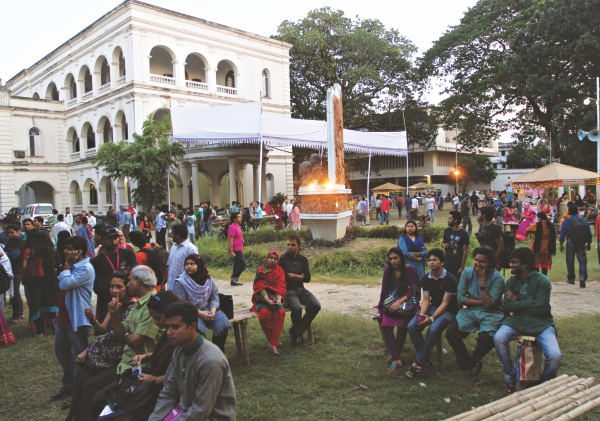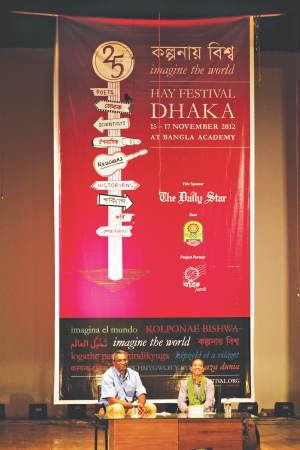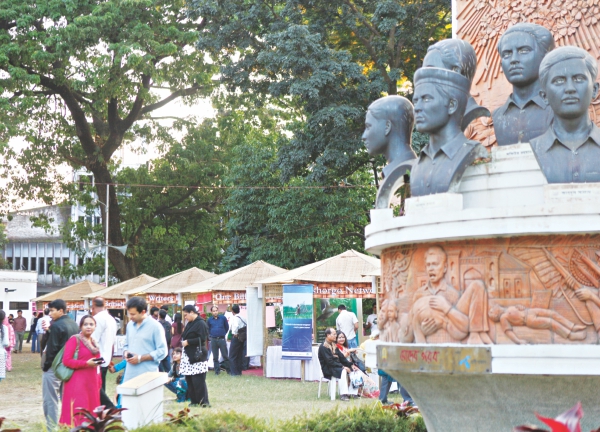
Inside
Original Forum |
| 2012: Lessons Learnt |
Bangladesh in 2013: Dangling
Between Hopes and Reality |
| Beyond the Rage -- Sushmita S Preetha |
| Law, Culture and Politics of Hartal -- Dr Zahidul Islam Biswas |
| Victory's Silence -- Bina D'Costa |
Can Children Deny Maintaining their Elderly Parents? --- Mariha Zaman Khan |
Let's Talk about Domestic Violence! -- Ishita Dutta |
An Unfinished Story -- Deb Mukharji |
| A Tale of Political Dynasties -- Syed Badrul Ahsan |
| “Bangladesh Brand”: Exploring potentials -- Makluka Jinia and Dr. Ershad Ali |
| Give Dignity a Chance: Two observations and five takeaways -- Lutfey Siddiqi |
| Diplomatic Snubs and Put-downs -- Megasthenes |
| Hay Festival: International Interactions of Literature, Culture and Creativity -- Farhan Ishraq |
| Endnote -- Kajalie Shehreen Islam |
Hay Festival: International Interactions of Literature, Culture and Creativity
It was a platform for the exchange of cultures, says FARHAN ISHRAQ.
 Palash Khan
Palash Khan
It is defensible through historical experiences that anything launched for knowledge, human rights and promotions always travels beyond the boundary whether it is literary, political or cultural. The historic Language Movement of 1952 reached its culmination when the international community recognised the national achievement of Bengalis accepting their Language Day as the International Mother Language Day. On the other hand, the Hay Festival also originated from the language struggle of the people of Wales. It is to be remembered here that Wales was the first occupied colony of the British imperialists. Introduced in the city of Hay in the United Kingdom the Hay Festival took its turn to the historic grounds of Bangla Academy, Dhaka for the second in November last year. It came to Dhaka for the first time with a pilot event at the British Council a year back on 21 November 2011.
The second Hay Festival Dhaka was held on 15-17 November 2012 at the newly built auditorium and grounds of Bangla Academy with internationally acclaimed scholars from various disciplines of creativity -- writers, thinkers, academicians, artists, filmmakers, publishers, songsters and dancers. Playing its part to expedite the mission of creativity and cultural synchronisation it ventured to bridge cultures around the globe. It has undeniably been an entertaining experience for different creative generations of the country coming in closer contact with so many global talents in diverse fields of culture and creativity. With the launching of the genial Hay sessions, the torch-bearing role of Bangla Academy in matters of art and creativity was displayed in national and international contexts. Since most of the missions by the academy are often confined to the national territory, it is through the array of events that the global transshipment of creativity happened to delve into fresher prospects.
The Hay Festival was launched for the second time in Dhaka with almost 100 eminent Bangladeshi writers and 30 international writers including Syed Shamsul Haq, Hasnat Abdul Hye, Selina Hossain, Vikram Seth, Kaiser Haq, Fakrul Alam, Philip Henser and Peter Florence from South Asia and beyond. It will be a milestone in the history of boundary-breaking drive of culture and creativity as the festivity has bound together the writers of Bangla and English together with other languages. The theme of the festival 'imagine the world' implies what conceptual thinking it prefers to cherish for the sake of boosting art, culture and creativity beyond boundaries.
 |
|
Rashed Sumon |
In the perspective of Bangladeshi literature it is a reality that writers who mostly contribute in Bangla and those whose expertise is in English live poles apart despite the fact that they exist in and represent the same society. Things taking place in the matrix of such a socio-economic infrastructure can create equal effect in the mindsets of other continents only when they are put into an international language like English. The gulf between the two creative communities is an obstacle to the possibility of harmonious coexistence and affordable interactions. The Bangladeshi writers of both languages and the writers of Bangladeshi origin living in other parts of the globe should be bound with some aesthetic and intellectual fabrics for the greater interest of culture and creativity. The Hay Festival, I believe, ventured to fulfill most of the exigency with its timely tactics and affordable thinking modules.
It is a fact supported by history that the Bengali speaking zones of the Indian subcontinent remained under the process of colonisation for almost two centuries and underwent massive sociolinguistic interactions between the locals and the colonial dominators. Languages of the colonisers, especially English, inspired the colonised to be adept in it for attaining greater social majesty and establishment. It was an equation of dependency and submission but in the postcolonial phase it has been a crying need among the natives to interact with the global peoples for reflecting the life and society through the art of writing and intellectuality.
Well over half a century since the Bangladesh territory came out of the grab of colonialism, situations so prevail that people in independent nation-states compromise with the colonial past and liberally deal with the question of languages under certain circumstances. In the reality of the reordered world culture and economy, English does not remain a language for the colonisers; it has rather been a tool for transporting ideas and realities both to the locals and the global communities.
Regional restrictions of culture and creativity can necessarily be overcome in the fervour that it will bring parts of the globe closer to one another and in the greater urgency that the whole world will be contained within itself with maximum varieties and pluralities. One of the most affordable preconditions for supporting it is that the influential states or the super powers as they are popularly known might not interfere with the liberally accepted cultural theories and let cultures around the globe flourish in its own way and style.
Both culture and creativity have a recycling tendency for their survival, they die or survive not from the question of their intermingling realities but from their distinctive essence they nurse in them. People often raise the question whether culture being set into global context attains proper dignity in the situation which does not allow equal sharing among nations of varied status. There is sensible claim in it, no doubt, but a distinctive feature of culture and creativity can be rescued from it. It is that 'then culture will have to grow again from the soil' and the expression 'it must grow again from the soil' does not denote that 'it will be brought into existence by any activity of political demagogues'.
During the three Hay Days the Academy premises vibrated with multinational celebrations with intellectual entertainment under broader ideals; many novelists, poets and litterateurs gathered with a view to maximising the exposure of Bangladeshi writers to the audiences of other south Asian nations and elsewhere around the globe. The festival did have its thematic projection designed in accordance with the goals and objectives of Bangla Academy, the British Council and The Daily Star with nothing contradictory to the spirit of Bengali-ism and the commitment of Bangla Academy.
The speech of Bangla Academy's Director-General Shamsuzzaman Khan, detailed the ground behind the Academy's standpoint of hosting such a festival as the Hay. He reflected that translations of classic volumes of prose and most treasured verses in Bangla would play a guiding part to showcase the treasure of Bangla fictions and nonfictions enabling them to have global readership. His declaration of instituting a separate department for translating Bangla writings into English and vice versa and launching books in both languages is worth sensitising the mind of any creative and intellectual worker. It is a green signal to boosting creativity in the time to come and his indication that many more such events would take place in future is truly inspiring for literary creators, readers and publishing entrepreneurs. In his concluding note Khan narrated the historical parallel of the two language movements that took place in two different corners of the world and in two historical periods. He further said that the accusation of some people or quarters marking the Hay Festival as an imperialistic design was baseless, unfounded and totally devoid of historic knowledge and comprehension. Earlier on the eve of the celebration he explained, “A global literary event provides opportunities for everyone involved: writers, literary agents, publishers, translators, researchers and booklovers. With the festival located at the Bangla Academy it means greater exchange of ideas and new literary perspectives. It means greater cooperation and increased exposure for writers and Bangla literature.”
Of the recent drive of English writing in Bangladesh and the utility of launching the Hay Festival in Dhaka, Mahfuz Anam, Editor and Publisher of The Daily Star reflects, “We have witnessed with considerable satisfaction and pride the steady but significant rise in Bangladesh of literary activities in English. He added that holding the Hay Festival in Dhaka would greatly add to the process of literary creativity. While reflecting at the closing session, he was optimistic in affirming that writings from Bangladesh would be more exposed to the international arena through the festival.” Celebrated fictionist Selina Hossain in her Hay Speech reflected, “Instituting this festival at Bangla Academy which is an offspring of language martyrs' blood has extended to some extent the Bangla language and literature.” She said the Hay Festival had brought the East and the West closer to one another and emphasised the need for exposing through translation the vital enrichment of Bangladeshi literature to the global auditorium.
The Bangla classics trans-created in English and fictional-nonfictional writings originally produced in English by the local writers can showcase the nation's heritages and identities among the global communities. It cannot be argued that creativity has its own way of expression irrespective of languages it exploits. Yet the literary stylistics maintained in the writings of the original territory will thus not be followed literally, it will rather be applied in a pattern truly linked with the local life and reality within a vast range from centre to parameter.
 Rashed Sumon
Rashed Sumon
Again, Bangladesh and India shared the same colonial experiences, and as such, the linguistic situations in the two countries should not have been much different from one another. What actually appears is quite a sharp contrast owing to the fact that the vibrant economic development of India assisted the country taking its literature to the world market in a wider scale. Moreover, it is worth feeling that India has more political, anthropological, geographical and sociolinguistic varieties than Bangladesh. The country has an English speaking population as well, excluding the tourists who come there for the time being. Bangladesh does not have any practical scope of using English in real-life situation. Bangladesh failed to attain such development as India made possible, it is not untrue, but for its geopolitical position and under the inspiring impact of Indian literary renaissance it is expected to reach the desired goal in a shorter time.
It is an easily acceptable fact that people in an unprogressive nation feel prejudiced against cultural pushing and even its imposition if there is any. As to the context of cultural globalisation, they sometimes indulge in the debate of ratio -- how much we can exert upon the advanced world and how much impact we come under beyond our choice and freedom. The question is connected with the rate of economic and political improvement; the more we signify in geopolitical scenario the more notably we have to achieve from the arrangements of cultural and creative interpretations among nations, especially the nations in the south Asian territory. As soon as the Hay Festival arrived at Bangla Academy it resulted in unique interactions of cultural heritages of the host country. Those who attempted in vain to protest it in the name of corporatism are therefore deviated from the thematic concern and broad ideals of Bangla Academy.
It is also worth noting that only a year back, Bangla Academy arranged the First International Literary Conference with participants from South Asian regions and other countries around the world. The launching was a grand success in mainstream Bangla as well as in English writing circles. As far as human nature is concerned, human culture is to the broader implication undivided and of the same universal instinct. This undivided human culture is now flowing high around the globe beyond local margins. Cultural plurality beyond restriction and liberated human sharing attempts to form the undivided human culture and creativity.
Apart from the first Hay Festival at the British Council, the second at Bangla Academy has got wider implication with its conceptual blending with the host heritage and with its being modified from the origin. Marketing or transshipment of literary and intellectual products of a third world country like Bangladesh is a more crucial question than it is in the case of India as it has already made provisions for exporting their intellectual properties abroad. Hampered by certain political impositions the academy over the years seemed to minimise itself into an institution for providing mere livelihoods.
The Hay Festival, crossing four continents with celebrations in Kenya, Spain, Mexico, Turkey and lastly in Bangladesh, reached its climax with its intercontinental march of conquering human minds and cultures. It has been a fresher provision for reimagining the world in creating and launching literary efforts at home and around the globe. The spirit of the festival will help the new generation writings of Bangladesh in context with eternal cultures and heritages to find an international voice and to found a creative Bangladesh.
Farhan Ishraq is a poet and Assistant Director of Bangla Academy.